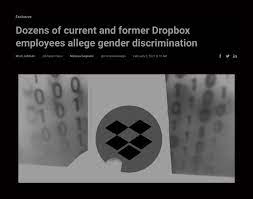Dozens of Current Dropbox Employees Allege Gender Discrimination

The Allegations
The allegations of gender discrimination at Dropbox are serious and numerous. According to reports, several female employees have claimed that they were passed over for promotions in favor of less qualified male colleagues. Others have alleged that they were subjected to unequal pay, with male counterparts earning significantly more for similar roles and responsibilities. Additionally, some women have reported experiencing a hostile work environment, including instances of harassment and exclusion from important decision-making processes.
Potential Causes
Understanding the potential causes of gender discrimination at Dropbox is crucial in addressing the issue effectively. One possible cause is unconscious bias, which can lead to subtle but significant disparities in how men and women are evaluated and rewarded. Another factor could be a lack of diversity and inclusion initiatives within the company, resulting in a predominantly male-dominated culture that perpetuates gender inequality. Additionally, the tech industry as a whole has long struggled with gender disparities, making it more challenging for companies like Dropbox to achieve gender parity.
Implications for Dropbox
The allegations of gender discrimination have significant implications for Dropbox as a company. Firstly, these claims tarnish the company’s reputation as a progressive and inclusive workplace. In an industry where talent acquisition and retention are highly competitive, such negative publicity can deter top talent from considering employment at Dropbox. Moreover, these allegations may result in legal consequences, including potential lawsuits and damage to the company’s financial standing. Additionally, the morale and productivity of current employees may be negatively impacted, leading to a decline in overall performance.
Possible Solutions
Addressing gender discrimination requires a comprehensive approach that involves both short-term and long-term solutions. In the short term, Dropbox should conduct a thorough investigation into the allegations, ensuring transparency and accountability throughout the process. Any instances of discrimination should be addressed promptly and appropriate actions taken, including disciplinary measures if necessary. Additionally, the company should prioritize diversity and inclusion initiatives, such as unconscious bias training and mentorship programs, to create a more equitable work environment. Long-term solutions may involve implementing policies that promote pay equity, increasing the representation of women in leadership positions, and fostering a culture of respect and inclusivity.
Conclusion:
The allegations of gender discrimination at Dropbox highlight the ongoing challenges faced by women in the tech industry. These claims not only raise concerns about the company’s commitment to equality but also have significant implications for its reputation and overall success. It is imperative for Dropbox to take these allegations seriously, conduct a thorough investigation, and implement meaningful changes to address gender disparities within the organization. By doing so, Dropbox can not only create a more inclusive work environment but also serve as a positive example for other companies in the tech industry to follow.






